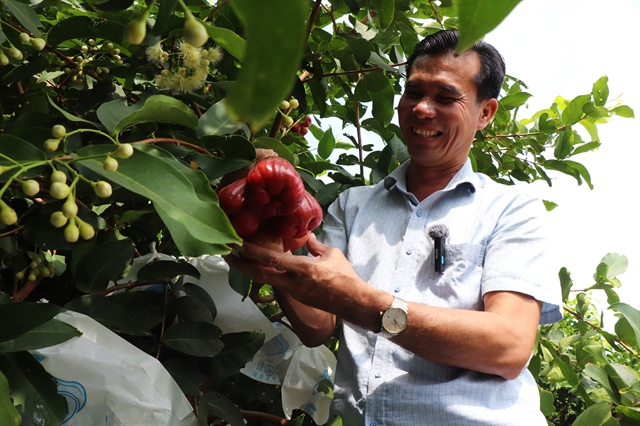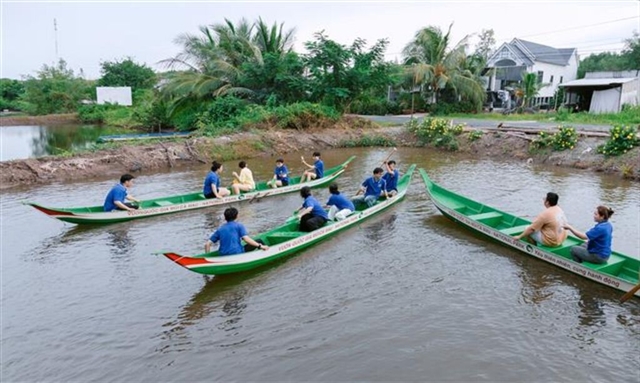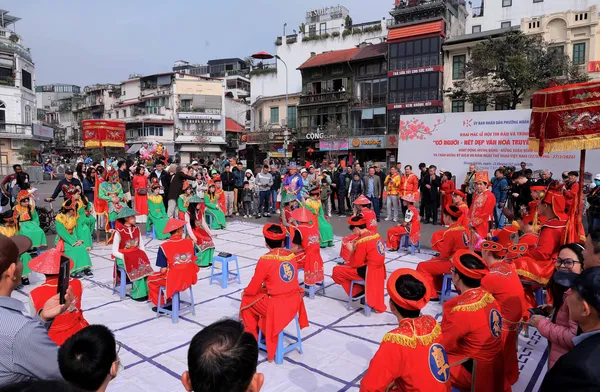 Life & Style
Life & Style

Foreign tourists could be set to return to Viet Nam this autumn if a vaccine passport scheme is approved.
Lê Hương
Foreign tourists could be set to return to Việt Nam this autumn if a vaccine passport scheme is approved.
The spectacular island of Phú Quốc in the southern province of Kiên Giang is set to become the first place to receive foreign tourists since borders were shut last year due to the COVID-19 pandemic.
The Politburo directed agencies and local authorities to trial a vaccine passport scheme for tourists to some tourism destinations where the pandemic is under control. The first destination proposed was Phú Quốc. The model will be expanded to other areas if it succeeds.
The Ministry of Culture, Sports and Tourism proposed the Government apply the policy to the Russian market first.
Travel experts have said that local residents should be vaccinated before tourists are allowed in, as should migrant workers on the island.
International tourists who want to enter the island should have a certificate proving they have been vaccinated together and a negative PCR test certificate.
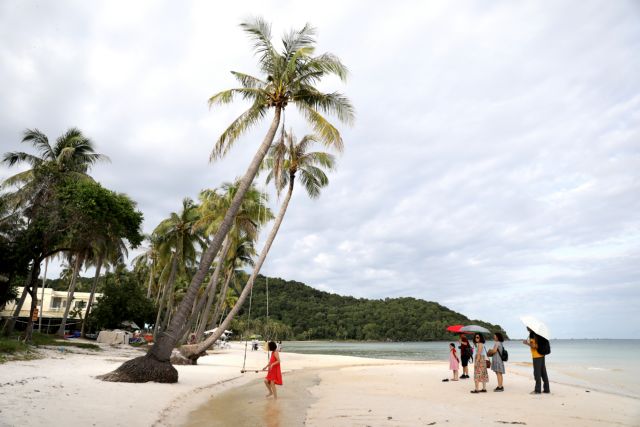
|
| Phú Quốc hosts the most beautiful beaches in the country. VNS Photo Đoàn Tùng |
The island should be isolated from the mainland, experts suggested.
“This is a good model for the country to open to foreigners if the whole population of 178,000 gets vaccine injections,” Nguyễn Quý Phương, head of Travel Agency Department of the Việt Nam National Administration of Tourism, told Việt Nam News.
Local authorities plan to ask the Government to vaccinate the entire local population.
The pearl island hopes to welcome the first foreign tourist in late September or early October, according to Lâm Minh Thành, chairman of Kiên Giang Province’s People’s Committee
He said some 1,500 people on the island were vaccinated in early May.
Thành said the province has calculated the budget for the inoculation campaign and would mobilise local donations.
The localities have drafted plans to receive international and domestic visitors with areas for quarantine.
The plan for vaccinations and receiving guests will be submitted to the Government soon.
Thành said the limited amount of vaccines is an obstacle.
“We want the Government to give vaccine priority to the province,” he said.
Before the pandemic, the island received a total of 5-6 million foreign and domestic tourists each year.
In 2020, Kiên Giang Province received 5.2 million visitors, a 40.7 per cent decrease against 2019.
The number of international visitors to the province was 185,000 people, a 74.1 per cent decrease against that in 2019. Total income from tourism topped VNĐ7.8 trillion (US$340 million), a 57.7 per cent decrease against 2019.
Only foreigners?
The Tourism Advisory Board (TAB) has had discussions with the culture ministry on the plans for re-opening to foreign tourists.
“We need to clarify if trial tourism centres on the island will receive both domestic and foreign tourists or not,” said Hoàng Nhân Chính, head of the TAB Secretary Department. “We think we should not keep the most safety for all. In case we keep the distance between foreign and domestic tourists, we should border a small area for foreigners only."
Earlier this year, the culture ministry sent a document to Quảng Nam Province authorities to give in-principle approval to receive international guests in Hội An, but a vaccine passport scheme needs to be approved by the Politburo first.
Nguyễn Tiến Đạt, director of AZA Travel Company, suggested the tourism sector should apply a vaccine passport policy to domestic tourists first and only expand it to foreigners if it succeeds.
“Phú Quốc can be the first spot to receive international tourists with vaccine passports, then we can open to other places,” he said.
Golf and relaxation tours could be trialled first, he said.
Đạt said many localities now do not welcome people from outside and require quarantines before new entrants can move freely inside the province.
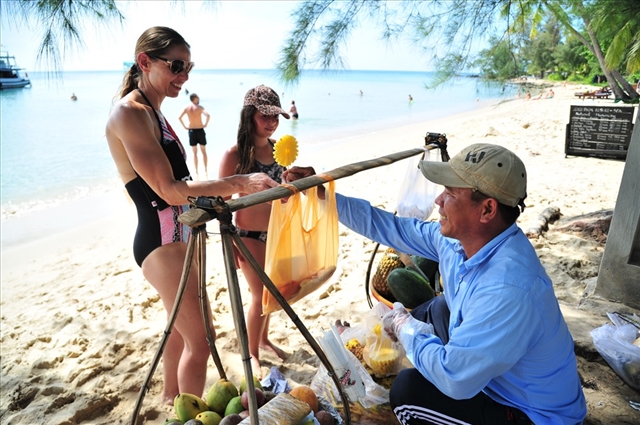
|
| Foreigners buy fruit from a beach vendor. Photo laodong.vn |
“Vaccine injections carried out in uniform with digitalising people’s vaccine certificates will ease the later period when our Government and tourism sector discuss with other partners in the world,” said Phùng Quang Thắng, director of Hanoitourist, also chairman of the Hà Nội Travel Agency Association.
Bùi Băng Giang, founder of Asia Exotica Vietnam Travel, said her partners in Europe and South America said Việt Nam was among their first destinations.
“They are just waiting for Việt Nam to open her doors as Việt Nam has controlled the pandemic very well and tourism services have not been totally frozen like those in neighbouring countries,” she said.
“Tourism companies like ours are longing for the Government's announcement on the official opening day and clear regulations for foreign tourists.
"We have missed the chance to open the doors earlier than other countries in the region as we are late in giving vaccines to locals and approving vaccine passport.
"Now I just dare to consult my partners to plan for tours in Việt Nam from the second quarter of 2022," Giang said.
Digitalising vaccination
Over 2.57 million vaccine injections have been doled out in Việt Nam, with some 134,000 people receiving both doses.
Experts see the need to digitalise statistics on international software to create vaccine passports.
Tourism expert Lương Hoài Nam explained that individuals should have a QR code on their smartphone containing their vaccination information.
“Vaccine passports are an advanced solution to ease both domestic and international travelling,” he said. “It’s a crucial tool now.”
Domestic airlines like Vietnam Airlines and Vietjet Air are planning to accept the AITA Travel Pass.
According to forecasts, Việt Nam's tourism sector needs at least five years to recover from the consequences of COVID-19.
The number of foreign arrivals to Việt Nam in 2020 fell 79 per cent against 2019 and the number of domestic tourists reduced by 34 per cent. Some 95 per cent of international travel agencies stopped operations while 40-60 per cent of tourism workers lost their jobs or saw their working hours reduced. VNS
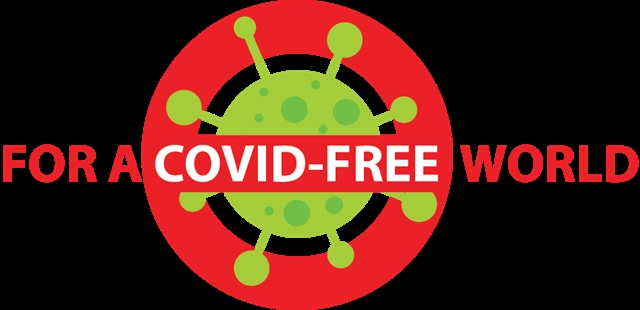
|

